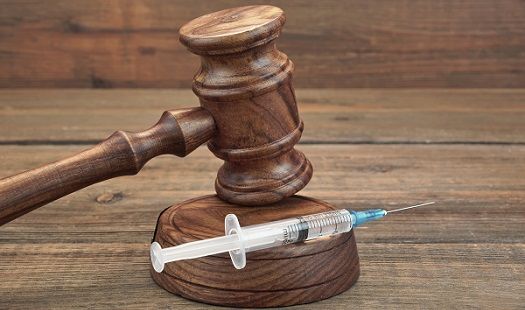While Drug Makers Battle in Court Over Popular MS Treatment, Implications for Patients Remain Unclear
Embattled Mylan scored a victory when Teva's patents for Copaxone were invalidated. The decision comes on the eve of a trial in which Teva will fight two other pharmaceutical companies over the right to produce glatiramer acetate treatments for multiple sclerosis.

The US Patent and Trade Office ruled last week to invalidate the patents held by Teva on a novel multiple sclerosis (MS) treatment. Glatiramer acetate (GA), sold in a 40mg injectable version as Copaxone, is a drug thought to alter the immune processes that trigger MS relapses, though it is not necessarily an immunosuppressant.
The challenge was brought by rival pharmaceutical producer Mylan. Though glatiramer acetate has been produced and sold generically in daily 20mg injectable doses for the past year, Teva has held exclusive rights on the thrice-weekly 40mg version. Two of their patents were invalidated in the case, with a decision on a third patent expected this week. Mylan’s argument is that a dosage amount of a drug isn’t worthy of exclusive distribution. An appeal from Teva is likely inevitable.
GA’s exact working mechanism is unknown, though it's believed to alter immune responses. It consists of four amino acids found in myelin sheaths, the protective layers that coat some nerves and that the immune system attacks in MS patients. It is thought that GA distracts the system, protecting the sheaths by taking the brunt of the immune attack.
Receiving FDA approval in 1996, GA treatment seems to perform positively in long-term studies. A 2013 study followed 74 patients for 10 years, reporting 64.8% suffered one or less exacerbations in the test period, and 71.6% showed no or minimal disease progression. A paper published in 2010 reported the results of a 15 year study which began with 231 patients but only saw 100 finish the full duration of the study. Given the long length, most withdrawals were associated with patient’s life decisions, though a portion did perceive their symptoms to be worsening. The cohort that finished the trial showed no major adverse side effects and demonstrated reductions in both relapses and disease progression.
GA is perceived to be a safe and likely effective treatment option. Copaxone is one of the most popularly prescribed MS treatments, accounting for 30% of all MS prescriptions, according to the New York Times.
Even with the lower-dose competition, the drug represents over $3 billion in annual sales for Teva, accounting for 20% of its revenue, according to Bloomberg. A court case is set to begin later this month in Delaware as Teva attempts to sue Momenta and Novartis, the makers of the 20mg generic versions. The invalidation of their patents is seen as a serious blow to Teva’s legal standing in that case.
With four major pharmaceutical producers jockeying in the courts, the implications for patients and drug prices are not yet known. MS drugs are notoriously expensive, with many, Copaxone included, costing $60,000 or more annually.
More competition can undercut drug prices as much as 90%, though at least two of the parties involved seem to be trying to avoid that. Mylan, currently facing mass criticism over their Epi Pen pricing practices, hopes to be able to receive a patent for its own GA version and receive the standard 180-day exclusivity protection to launch and sell it. Teva currently has about 80% of their MS patients on their protected 40mg Copaxone dose.